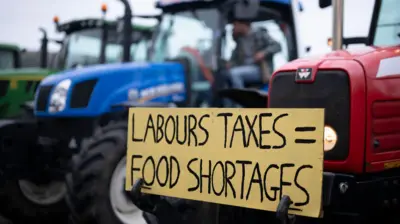We've updated our Privacy and Cookies Policy
We've made some important changes to our Privacy and Cookies Policy and we want you to know what this means for you and your data.
Tax powers bill clears hurdle - how many more to come?
- Author, David Cornock
- Role, 91ČČąŹ Wales Parliamentary correspondent
The lockstep is dead.
Its demise was approved by MPs without a vote this afternoon. The lockstep, for those among you who have better things to do than focus on fiscal devolution, was the clause of the Wales Bill that would have ensured any change in the basic rate of Welsh income tax had to be mirrored by a similar change in the higher or top rate. Our devolution dictionary is here, should you require further assistance.
Welsh Secretary Stephen Crabb told MPs: "By removing the lockstep we are removing what was widely seen as a deterrent to the Welsh government accepting the devolution of income tax in Wales."
He accused Labour First Minister Carwyn Jones of hiding behind "the self-imposed barrier of funding" in opposing the partial devolution of income tax until Wales gets a better financial settlement from Westminster. Mr Crabb suggested only Colin Jackson was capable of clearing all the hurdles Labour wanted to erect over income tax.
His Labour shadow, Owen Smith, said the UK government had performed a hand-brake U-turn on the lockstep months after it opposed its removal. He suggested that in the light of the Smith Commission report in Scotland there was now a case for going further with the devolution of income tax to Wales.
Mr Crabb said the tax powers transferred by the bill - and the full devolution of income tax - could see the Welsh government becoming responsible for raising around a quarter of the money it spends.
That share will only be reached after a referendum Carwyn Jones appears to be in no hurry to hold. Montgomeryshire Tory MP Glyn Davies suggested Mr Jones was now adding the non-devolution of air passenger duty to the list of hurdles stopping him holding a referendum.
Mr Davies's solution? Ditch the referendum and devolve tax powers if they're proposed in the winning party's (or parties') manifesto in next May's election. Wales Office Minister Alun Cairns gave a non-committal response to Mr Davies's suggestion.
There is sympathy in UK government circles for the tax referendum being a general plebiscite on a wider package of devolved powers but - if the Conservatives are still in power after the election - the more resistant Welsh government ministers appear to the idea of an early referendum the more chance there is of Mr Davies's campaign to scrap the vote being successful.
Its parliamentary journey over, the Wales Bill is expected to receive royal assent and become law early in 2015.
Top Stories
More to explore
Most read
Content is not available








